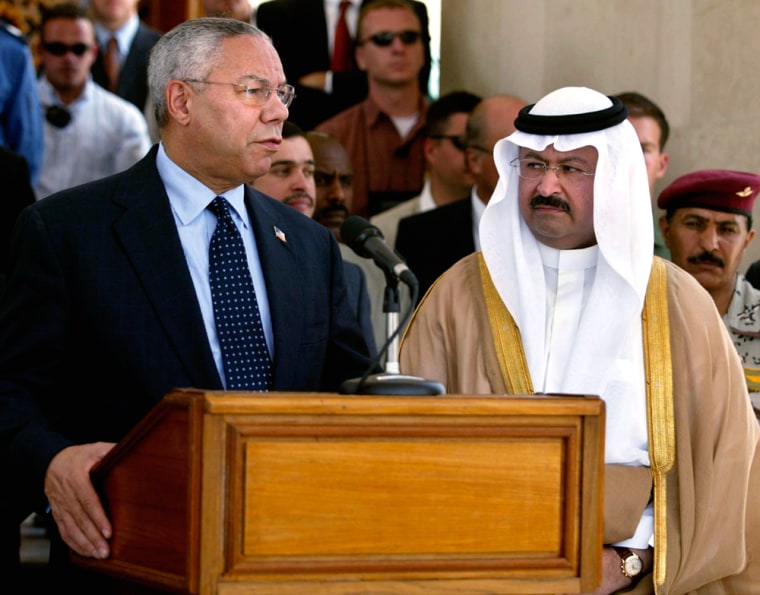Secretary of State Colin Powell made a surprise visit to Baghdad on Friday, his first visit to the country since the handover of power to an Iraqi government on June 28. Powell stood beside Iraqi interim President Ghazi al-Yawer and told reporters, "It's a great pleasure for me to be back in Baghdad, a Baghdad that is now free and sovereign under its new leadership."
Powell, who as Secretary of State is in charge of Iraq policy for the U.S. government, was in Baghdad to receive updates on the U.S. presence there and to meet with Iraqi officials.
The Secretary of State met with U.S. Ambassador John Negroponte as well as coalition commander Gen George Casey and the U.S. three-star general in charge of training Iraqi forces Lt. Gen. David Petraeus prior to meeting with the Iraqi president.
Democracy on track
Powell is in Iraq as part of a European and Middle East tour, meeting with coalition and other partners, shoring up support for the coalition.
Powell and al-Yawer said democracy building is on track in Iraq. Powell said he is looking forward to an Iraqi national conference, originally scheduled for this weekend but put off until mid-August.
“We looked forward to the national conference that will be held in two weeks time, where the people of Iraq can assemble and speak to their leaders and begin to debate amongst themselves...about the kind of Iraq that they wish to see,” said Powell.
In fact, the Iraqi leader said Iraq was ready for the conference, which was supposed to begin tomorrow, and only put off the session at the "strong" urging of the U.N.
"We didn't want to postpone. It was upon the strong recommendation of the United Nations that we postponed for two weeks," al-Yawer said Friday.
The Iraqi leader was quick to emphasized the strong working relationship between the U.S. and the interim Iraqi government.
“We're dealing with the Americans as partners, strategic partners in this part of the world. We are a sovereign state. Ambassador Negroponte is working exactly 100 percent as a diplomat, an ambassador of a superpower,” said al-Yawer.
The Iraqi leader said elections are still slated for January and that they are working "around the clock" to make them happen on time.
Continuing to build coalition
With Iraq beset throughout much of the country by violence and kidnappings, it has complicated efforts to attract more coalition troops to help in the effort to stabilize the country.
A new Saudi proposal to send Muslim forces to Iraq under United Nations control, perhaps ultimately to replace coalition troops, will be discussed by the Iraqi government said al-Yawer, Iraq's president.
In the Saudi port city of Jiddah, Powell met with interim Iraqi Prime Minister Ayad Allawi, who wants Muslim nations to dispatch troops to Iraq to help defeat an insurgency that he said threatens all Islamic countries.
Allawi made the appeal a day after Saudi officials disclosed that they had initiated an effort to encourage the creation of a Muslim security force to help bring stability to Iraq.
Powell said he did not know whether the proposed force would complement the coalition or would be a one-for-one substitution. The number of Muslim troops in the coalition is believed to be scant.
Al-Yawer was clear in his belief that Iraq will prevail over the enemy insurgents. "The army of the darkness is getting more helpless and hopeless. That's why they are getting, stepping up these things. Time and the place is on our side, I tell you," said al-Yawer.
